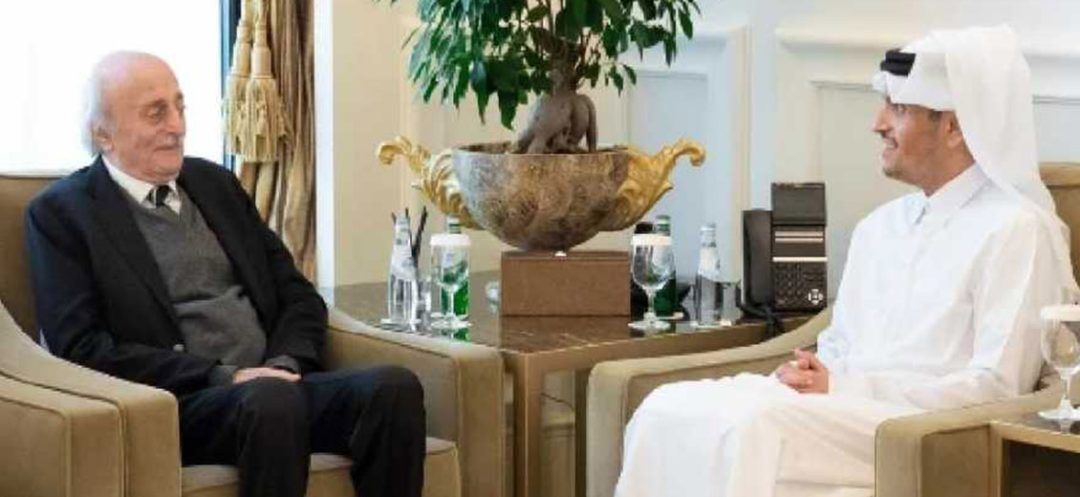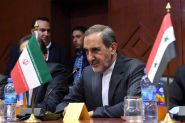
The former head of the Progressive Socialist Party (PSP), Walid Joumblatt, said from Doha on Tuesday that it is “inevitable for the (Lebanese) political forces to agree, with the help of the Quintet (USA, France, Saudi Arabia, Egypt and Qatar) to elect a president on the basis of dialogue and consensus.”
Joumblatt made his remarks during a meeting with the Lebanese diaspora at the Lebanese Embassy in Doha, in the presence of Ambassador Farah Berry.
The Druze leader is currently visiting Qatar at the invitation of the Qatari Prime Minister and Minister of Foreign Affairs, Mohammad ben Abdel Rahman al-Thani, who received him on Tuesday morning. He is accompanied by his wife, Nora, his son MP Teymour Joumblatt, current leader of the PSP, and MP Hadi Abou el-Hosn.
Joumblatt also praised the role played by Qatar within the Quintet, tasked with helping Lebanon break the deadlock on the presidential elections.
Discussions with the Qatari officials covered the entire regional situation, in particular the war in Gaza and South Lebanon, as well as current political developments in Lebanon.
The meeting took place against the backdrop of several recent visits to Doha by Lebanese officials to discuss the presidential elections, which are becoming increasingly urgent after more than 18 months of vacancy at the top post.
These visits fueled speculation about a possible Doha 2 conference, similar to the one held in 2008, which gave General Michel Sleiman access to the presidency.
Joumblatt expressed his “attachment” to the Doha conference (2008), as well as to the Taif agreement (1989), pending “a possible opportunity to improve the provisions of this agreement, particularly with regard to administrative decentralization.” In this respect, he specified that he was “in favor of decentralization, not federalism or partition.”
He also praised the role played by the head of parliament, Nabih Berri, in dissociating the fate of Lebanon from that of Gaza. In his opinion, the war between Hamas and Israel “is only in its early stages,” estimating that it might last until the end of 2024 or even longer.”
He also addressed the question of the massive Syrian presence in Lebanon, reiterating his call to “categorize” it, i.e. to classify Syrians residing in Lebanon into categories, with a view to settling this issue. He called for a distinction to be made between migrants for “economic or humanitarian reasons, and the Syrian workforce needed for the Lebanese economy.” In his view, this would be a more judicious approach to avoid “random and hateful campaigns” calling for the repatriation of Syrians.
[readmore url="https://thisisbeirut.com.lb/lebanon/255015"
Joumblatt made his remarks during a meeting with the Lebanese diaspora at the Lebanese Embassy in Doha, in the presence of Ambassador Farah Berry.
The Druze leader is currently visiting Qatar at the invitation of the Qatari Prime Minister and Minister of Foreign Affairs, Mohammad ben Abdel Rahman al-Thani, who received him on Tuesday morning. He is accompanied by his wife, Nora, his son MP Teymour Joumblatt, current leader of the PSP, and MP Hadi Abou el-Hosn.
Joumblatt also praised the role played by Qatar within the Quintet, tasked with helping Lebanon break the deadlock on the presidential elections.
Discussions with the Qatari officials covered the entire regional situation, in particular the war in Gaza and South Lebanon, as well as current political developments in Lebanon.
The meeting took place against the backdrop of several recent visits to Doha by Lebanese officials to discuss the presidential elections, which are becoming increasingly urgent after more than 18 months of vacancy at the top post.
These visits fueled speculation about a possible Doha 2 conference, similar to the one held in 2008, which gave General Michel Sleiman access to the presidency.
Joumblatt expressed his “attachment” to the Doha conference (2008), as well as to the Taif agreement (1989), pending “a possible opportunity to improve the provisions of this agreement, particularly with regard to administrative decentralization.” In this respect, he specified that he was “in favor of decentralization, not federalism or partition.”
He also praised the role played by the head of parliament, Nabih Berri, in dissociating the fate of Lebanon from that of Gaza. In his opinion, the war between Hamas and Israel “is only in its early stages,” estimating that it might last until the end of 2024 or even longer.”
He also addressed the question of the massive Syrian presence in Lebanon, reiterating his call to “categorize” it, i.e. to classify Syrians residing in Lebanon into categories, with a view to settling this issue. He called for a distinction to be made between migrants for “economic or humanitarian reasons, and the Syrian workforce needed for the Lebanese economy.” In his view, this would be a more judicious approach to avoid “random and hateful campaigns” calling for the repatriation of Syrians.
[readmore url="https://thisisbeirut.com.lb/lebanon/255015"
Read more




Comments